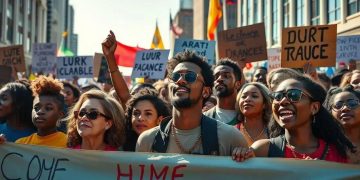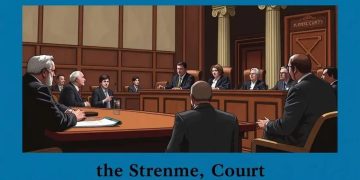Gun control debates: navigating complex issues and perspectives
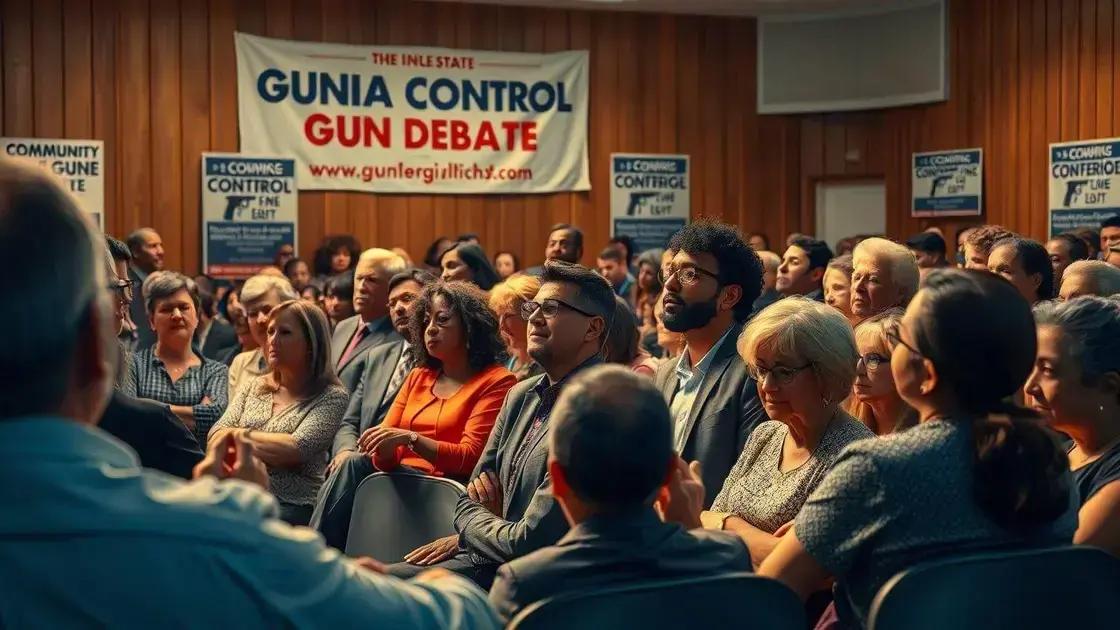
Anúncios
Gun control debates center around the balance between the right to own firearms and the need for public safety, influenced by cultural perceptions, legislation, and grassroots activism.
Gun control debates are more than just discussions; they reflect deep societal values and challenges. As various voices weigh in, understanding different perspectives helps us grasp the complexities involved. Ready to dive in?
Anúncios
Understanding the history of gun control
The history of gun control in the United States is filled with significant events and legislation that have shaped the dialogue we see today. Understanding this history is essential for grasping the modern debates surrounding firearms.
Initially, the Second Amendment of the U.S. Constitution, ratified in 1791, ensured the right to bear arms. This was primarily aimed at maintaining militias for defense. Over the years, however, various societal changes prompted discussions about regulating gun ownership.
Anúncios
The Early Laws
In the late 19th and early 20th centuries, states began passing laws to regulate firearms more specifically. For instance, many states enacted laws requiring permits to carry concealed weapons. These laws aimed to address rising concerns over public safety.
Key Legislation
- The National Firearms Act of 1934 imposed regulations on certain types of firearms, including machine guns.
- The Gun Control Act of 1968 aimed to curb the sale of firearms to individuals deemed unsafe, including felons and individuals with mental health issues.
- The Brady Handgun Violence Prevention Act of 1993 instituted background checks for gun purchasers.
- The Assault Weapons Ban of 1994 temporarily prohibited the sale of specific semi-automatic weapons.
Each of these laws was a response to escalating gun-related violence and mass shootings, indicating that public safety concerns were significant motivators. Nevertheless, these measures often sparked intense political debates. Advocates argue that gun control laws are necessary to protect citizens, while opponents view them as infringements on their Constitutional rights.
The late 20th century saw the rise of grassroots movements advocating for both gun rights and control. Organizations emerged, rallying supporters and promoting their ideologies. Over the decades, these movements shaped the public’s perception of gun control and influenced policies at local, state, and federal levels.
Understanding this complex history enables us to view current gun control debates with greater insight. As society confronts issues such as rising gun violence, the discourse surrounding this topic continues to evolve.
Key statistics and facts about firearms
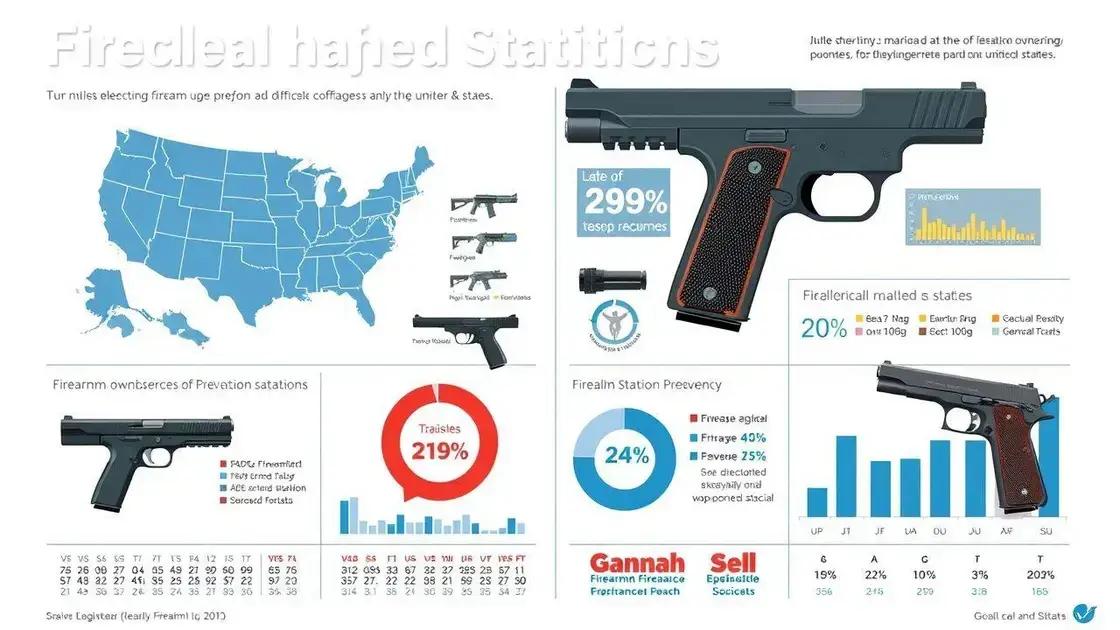
Understanding key statistics and facts about firearms is vital in the ongoing debates surrounding gun control. This information can help clarify the impact of guns on society and public safety.
According to recent studies, the number of firearms owned by civilians in the United States exceeds 390 million, which is more than the entire U.S. population. This statistic highlights the prevalence of guns in American life.
Firearm Mortality Rates
Firearm-related deaths have been a significant cause of concern. In 2021, there were over 48,000 gun-related fatalities, which includes homicides, suicides, and accidental deaths. These figures underscore the urgent need for effective measures to address gun violence.
Gun Ownership Demographics
- Approximately 30% of American adults own a gun.
- Gun ownership varies significantly by region, with higher rates in rural areas compared to urban centers.
- Men are more likely to own guns than women, with over 50% of men reporting firearm ownership.
- Sports shooting and hunting are the primary reasons cited for owning firearms, but self-defense is increasingly becoming a popular reason.
Research has also shown that states with stricter gun control laws tend to have lower rates of gun deaths. For example, states like Massachusetts and New York have implemented comprehensive background checks, which have contributed to decreased firearm fatalities.
Another aspect to consider is the impact of gun violence on communities. Areas experiencing high levels of gun violence face numerous challenges, including economic decline, trauma, and a reduced quality of life. Understanding these statistics can reveal the profound consequences firearms have on society.
As the gun control debate continues, these statistics play a crucial role in shaping public opinion and influencing policy decisions. Awareness of the realities behind firearm ownership and its consequences can lead to more informed discussions and decision-making.
The arguments for and against gun control
The arguments for and against gun control spark intense discussions across the country. Each side presents compelling points, making it essential to understand both perspectives.
Supporters of gun control emphasize public safety. They argue that stricter laws can lead to fewer gun-related deaths. For instance, countries with strict gun control measures have experienced lower rates of gun violence. Advocates also point out that common sense regulations, such as background checks, can prevent firearms from falling into the wrong hands.
Arguments for Gun Control
- Increased regulation can reduce gun violence and save lives.
- Background checks help keep guns away from criminals and those with mental health issues.
- Limitations on the types of firearms available can decrease the likelihood of mass shootings.
- Statistics show that states with stricter gun control laws have lower rates of gun-related homicides.
On the other hand, opponents of gun control claim that these regulations infringe on individual rights. They argue that the Second Amendment protects their right to bear arms without excessive government interference. Many believe that responsible gun ownership is a means of self-defense, especially in high-crime areas.
Arguments Against Gun Control
- Stricter laws infringe on personal freedoms and constitutional rights.
- Law-abiding citizens should not be penalized for the actions of criminals.
- Self-defense is a fundamental right; citizens may need firearms to protect themselves.
- Gun control measures may not effectively reduce crime rates.
Both sides use statistics and anecdotes to bolster their claims, creating a complex landscape of beliefs around the issue. It’s crucial to continue examining the evidence behind these arguments and consider the implications of each stance on society.
Impact of legislation on public safety
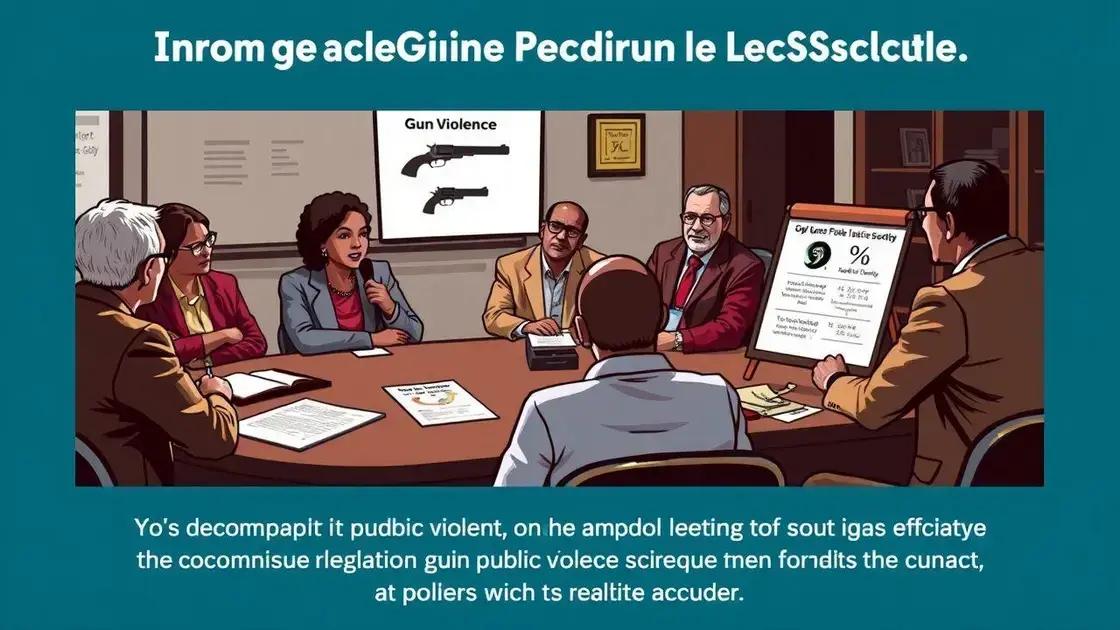
The impact of legislation on public safety is a critical topic in the gun control debate. Different laws can significantly change the rates of gun violence and overall safety in communities.
When examining the effects of legislation, it becomes evident that stricter gun control laws often correlate with a decrease in gun-related crimes. For example, states that have implemented comprehensive background checks have seen lower rates of firearm homicides and suicides. These data points illustrate how effective regulation can enhance public safety.
Evidence of Impact
Research supports the idea that when gun control measures are enacted, communities may experience:
- A reduction in gun deaths, particularly among children and teenagers.
- Fewer mass shootings and gun-related incidents in public areas.
- Increased confidence in community safety among residents.
Additionally, examining international examples can provide context. Countries with strict gun control laws, such as Australia and Japan, have notably lower rates of gun violence compared to the United States. These comparisons can be revealing when analyzing how legislation influences public safety.
On the contrary, opponents often argue that more regulations do not effectively prevent crime. They contend that individuals intent on committing violence will find ways to obtain firearms regardless of the laws in place. This viewpoint emphasizes the belief in personal responsibility and the right to self-defense, asserting that law-abiding citizens should not be hindered by regulations aimed at criminals.
Still, understanding the impact of existing legislation on various demographics helps clarify the debate. For instance, communities of color often experience higher rates of gun violence. Stricter laws in these areas could potentially reduce these alarming statistics and save lives.
The ongoing analysis of how gun control measures affect public safety remains vital. As communities strive for safer environments, the discussions surrounding effective legislation will continue to evolve.
Cultural perceptions of gun ownership
Cultural perceptions of gun ownership play a significant role in shaping public attitudes toward gun control. These perceptions vary widely across different regions and communities within the United States.
In many rural areas, gun ownership is seen as a tradition and a part of the lifestyle. Hunting and sport shooting are common activities that foster a sense of community and shared values. Here, firearms are often viewed as tools for recreation, self-sufficiency, and protection against threats.
Urban vs. Rural Perspectives
Conversely, in urban settings, the cultural views on gun ownership tend to lean towards skepticism. Many city dwellers associate firearms with crime and violence. Consequently, there is often stronger support for gun control measures in metropolitan areas, where the impact of gun violence is more pronounced. This divide can lead to misunderstandings between urban and rural populations, as each side holds different experiences and beliefs about the role of guns in society.
Influence of Media and Politics
Media representation also shapes cultural perceptions significantly. Positive portrayals of gun ownership in films and television can reinforce traditional views, while news coverage of gun violence can heighten fears and prompt calls for regulation. Politicians often use these narratives to rally support for their stances, further polarizing public opinion.
Moreover, advocacy groups on both sides influence how people think about gun ownership. Organizations promoting the right to bear arms emphasize personal freedom and protection, while those promoting gun control focus on safety and community welfare. These messages can resonate differently depending on an individual’s background and experiences.
Understanding how cultural perceptions shape the discussion surrounding gun ownership and gun control is essential. It provides insight into why certain policies are favored and allows for more empathetic discussions about the issue.
Future trends in gun control debates
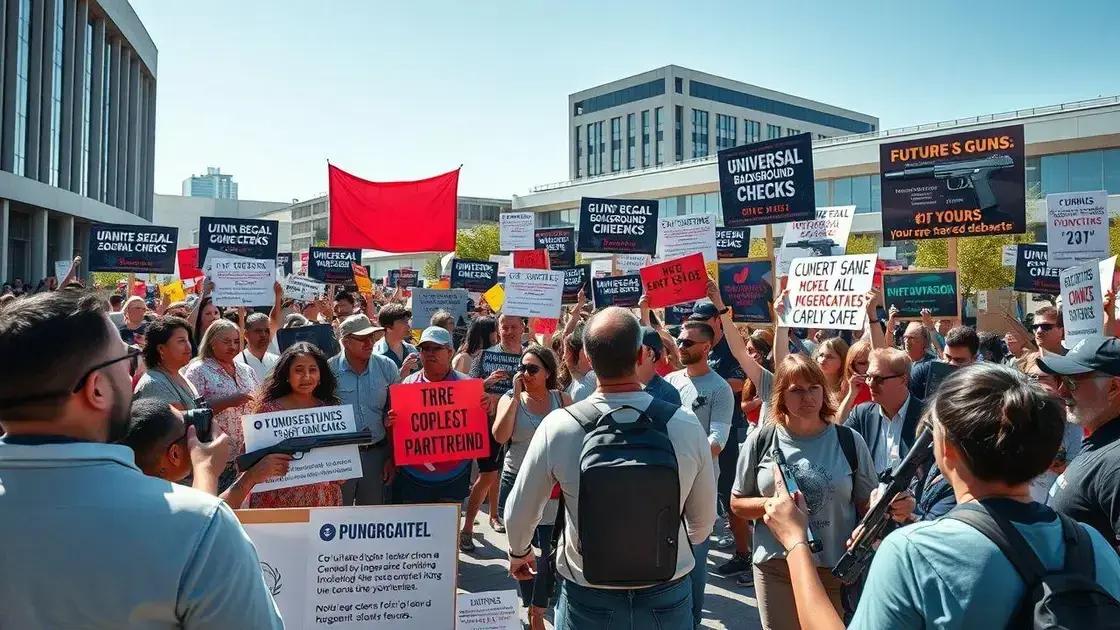
Future trends in gun control debates are increasingly shaped by evolving societal attitudes, technological advancements, and legislative changes. As public awareness of gun violence grows, discussions continue to develop in new directions.
One significant trend is the push for universal background checks. Advocates argue that this measure could prevent firearms from reaching individuals who pose a risk to themselves or others. As more states consider this legislation, it is likely to gain national attention and support.
Technological Advancements
Emerging technologies, such as smart guns, also play a role in these debates. Smart guns can only be fired by authorized users, potentially reducing accidental shootings and misuse. While some view this technology as a boon for safety, others see it as an infringement on their rights to own conventional firearms.
Community and Grassroots Movements
Grassroots movements are increasingly influential in shaping gun control discussions. Groups like March for Our Lives and Everytown for Gun Safety have mobilized young activists who are passionate about reducing gun violence. Their efforts have brought fresh perspectives that challenge traditional views on gun ownership and regulation.
Moreover, the role of social media in these movements cannot be overlooked. Platforms like Twitter and Instagram enable rapid sharing of information and mobilization of supporters, allowing discussions about gun control to reach wider audiences than ever before.
The intersection of mental health awareness and gun control is another evolving trend. As society becomes more conscious of mental health issues, there may be increased calls for regulations that consider mental health evaluations as part of the gun purchasing process. This raises important questions about fairness, accessibility, and the effectiveness of such measures.
Political Landscape
Finally, the political landscape will continue to influence the future of gun control debates. With elections approaching, candidates are likely to address these issues more prominently. Their positions on gun control could greatly affect public opinion and legislative action in the coming years.
Overall, the future of gun control discussions remains dynamic, reflecting ongoing societal changes and conflicts. The outcome of these debates will significantly impact the safety of communities across the nation.
gun control are complex and filled with different viewpoints. As we look to the future, it’s clear that public opinion, technological advances, and political initiatives will greatly shape how this issue evolves. Understanding the cultural perceptions surrounding gun ownership and the impact of legislation on public safety remains essential. By carefully examining these factors, we can engage in more informed and constructive conversations about creating safer communities for everyone.
FAQ – Frequently Asked Questions about Gun Control Debates
What are the main arguments for gun control?
Proponents argue that stricter laws can reduce gun violence, prevent firearms from reaching dangerous individuals, and enhance public safety.
How does gun ownership vary across different regions?
In rural areas, gun ownership is often seen as a tradition for hunting and protection, while urban areas may view it with skepticism due to higher crime rates.
What role do grassroots movements play in gun control debates?
Grassroots movements, especially led by young activists, focus on raising awareness and advocating for tighter regulations through social media and public demonstrations.
How can technology influence future gun control laws?
Emerging technologies, like smart guns, could change how laws are crafted, by making firearms safer and ensuring they are only used by authorized individuals.

